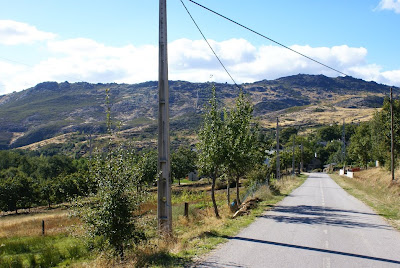
Porto was rainy and beautiful, an ancient coastal city home to the port industry and 270,000 residents. Just as we had dreamed, Porto felt both historic and comfortable. Stone buildings lined the brick and cobble streets, with balconies overflowing with plants and flowers. It seemed every home on each narrow street had a backyard vineyard, with chickens on their roofs, and pigeons cooing from holes in every rock wall and steeple. We stayed in the old downtown, within the area designated as a World Heritage Site.
Our ancient hotel had tiny rooms, with a deep narrow tub that I nearly fell out of trying to take a shower. It had been storming, so the darkened streets were damp and luscious, and we went for an evening stroll through the hilly city. We found museums and plazas, with plenty of public art projects and lush vegetation lovingly maintained. We were tiring and headed back toward our hotel when we saw light coming through a window on a side street. As we approached to read the signs posted there, a Portugese restaurant owner came out and grabbed us off the street, ushering us into his small café for a most delicious meal of fish and chicken, warming our bellies with excellent port and warm bread. No one spoke English, but it didn’t matter in the slightest. We smiled and thanked the man for the wonderful dinner, and waddled back to our hotel, falling into a deep sleep before getting an early start the next day. We called a taxi to take us to the bus stop, and with the help of an English-speaking Italian student, managed to get on the correct bus to head for the northern portion of Portugal, the most remote region of the country.
As we climbed up and out of Porto, we saw Eucalyptus trees and palm trees, but the vegetation changed the higher we climbed and moved inland away from the Atlantic Ocean. The public transportation system in Europe is amazingly cheap and efficient, and some of the buses we rode were nicer than some of the airplanes we had flown. We saw oxen carts parked in fields where work had ended the day before, and it’s true that it seemed that we’d entered a land that time had forgotten.
We rode the bus to the end of the line, and then hired a taxi to take us to our hotel, about a half-an-hour from the nearest town: A Lagosta Perdida, inside Montesinho natural park. The hotel, an ancient stone house, offers four rooms for stays, with a fabulous dinner and a light breakfast as part of the price. Our room was huge and overlooked the countryside.
Walking the streets and roads of the natural park, we met up with our first guardian dogs, of two native breeds. There is a program in place to distribute the Transmontano mastiff to cattle and sheep grazers in the park to protect their herds from wolf depredation. The park maintains a registry of mastiff litters and makes these dogs available to producers. Since the program’s inception in 1994, the result has been a decrease in depredations on both sheep and cattle.
In Europe, natural parks include towns and farms, hunting and livestock grazing, etc. A natural park is a protected area that includes "natural, semi-natural and humanized landscapes, of natural interest, representing harmonious integration of human activity with Nature."
(The photo above shows one of the most beautiful homes in the small town we stayed - love the stone house, rock walls and slate roof - this is traditional architecture. The photo below shows the town we stayed (yes, very very small, amid wolf range.)

The Transmontano mastiff originated in a pastoral livestock system where stock are grazed in uncultivated areas away from villages, with the continuous presence of wolves leading to its functional body structure of massiveness with long head and limbs, which enable it to travel with the herds. Ninety-five percent of the northern Transmontano dog population is reportedly still used to protect extensive sheep flocks from wolf predation. An aggressive program to reduce wolf predation on sheep and cattle herds in Portugal’s Montesinho Natural Park was begun in 1994, placing Transmontano Mastiff LPD pups with herdsmen. Transmontano mastiffs are quite reserved and docile, while not being highly aggressive. Work is being done to gain international recognition for this breed.

We also encountered a few Estrela mountain livestock protection dogs. The Estrela is probably the most widespread native breed of dog in Portugal. A traditional dog used to guard sheep high in the mountains, because of its beauty, the breed is widespread and often used as pets.
It was interesting to see both dog breeds, and it was notable that we heard concern about the working lineages of these dogs being overtaken by the pet/show lines.






4 comments:
Wonderful place, and great to have you back-- more, please!
The Estrella look to me like rez dogs! But that mastiff is something else! We could probably use a few!
Prairie Mary
Fantastic post! Can't wait for more!....L.B.
Very interesting!
Have you seen dogs with their herds, talk to herders?
Eugene
Post a Comment